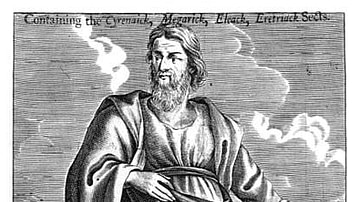Search
Search Results

Definition
Periander
Periander was the second tyrant of Corinth (d. c. 587 BCE); Diogenes Laertius only mentions that he was eighty when he died, meaning that he was probably born c. 667 BCE. His father Cypselus (r. 657-627 BCE), from whom the short-lived Cypselid...

Definition
Aristippus of Cyrene
Aristippus of Cyrene (l. c. 435-356 BCE) was a hedonistic Greek philosopher who was one of Socrates' students and founder of the Cyrenaic School of philosophy which taught that pleasure and the pursuit of pleasure was the highest good and...

Definition
Heinrich Bullinger
Heinrich Bullinger (l. 1504-1575) was a Swiss reformer, minister, and historian who succeeded Huldrych Zwingli (l. 1484-1531) as leader of the Reformed Church in Switzerland and became the theological bridge between Zwingli's work and that...

Definition
Cardinal Thomas Cajetan
Cardinal Thomas Cajetan (l.c. 1468-1534) was a Catholic theologian and philosopher best known for his disputations with Martin Luther (l. 1483-1546) beginning in 1518. Cajetan, a philosophical Humanist, was thought to have had the best chance...

Definition
Leo VI
Leo VI was emperor of the Byzantine empire from 886-912 CE. He was the second emperor of the Macedonian dynasty and is sometimes known as “Leo the Wise” in reference to his prolific literary output which ranged from orations to law codes...

Definition
Plutus (Play)
Plutus (aka Wealth) is a play written by the great Greek comedy playwright Aristophanes in 388 BCE. It was the last of his plays to be performed during his lifetime. Like his earlier play Ecclesiazusae (The Assemblywomen), Wealth was written...

Article
Women in Ancient Egypt
Women in ancient Egypt were regarded as the equals of men in every aspect save that of occupation. The man was the head of the household and nation, but women ran the home and contributed to the stability of that nation as artisans, brewers...

Article
Chaucer's The Book of the Duchess Full Text & Summary
The Book of the Duchess is the first major work of the English poet Geoffrey Chaucer (l. c. 1343-1400 CE), best known for his masterpiece The Canterbury Tales, composed in the last twelve years of his life and left unfinished at his death...

Article
The Admonitions of Ipuwer - A Tale of Chaos and the Importance of Government
The Admonitions of Ipuwer (also known as The Papyrus Ipuwer and The Admonitions of an Egyptian Sage) is a literary text dated to the Middle Kingdom of Egypt (2040-1782 BCE). The only extant copy of the work, preserved on the Papyrus Leiden...

Article
10 World War I Poems
The First World War (1914-18) stimulated a great wave of literary output, not least in the field of poetry. In an era when photography and film were still in their infancy, poems, especially those written by direct participants, were regularly...